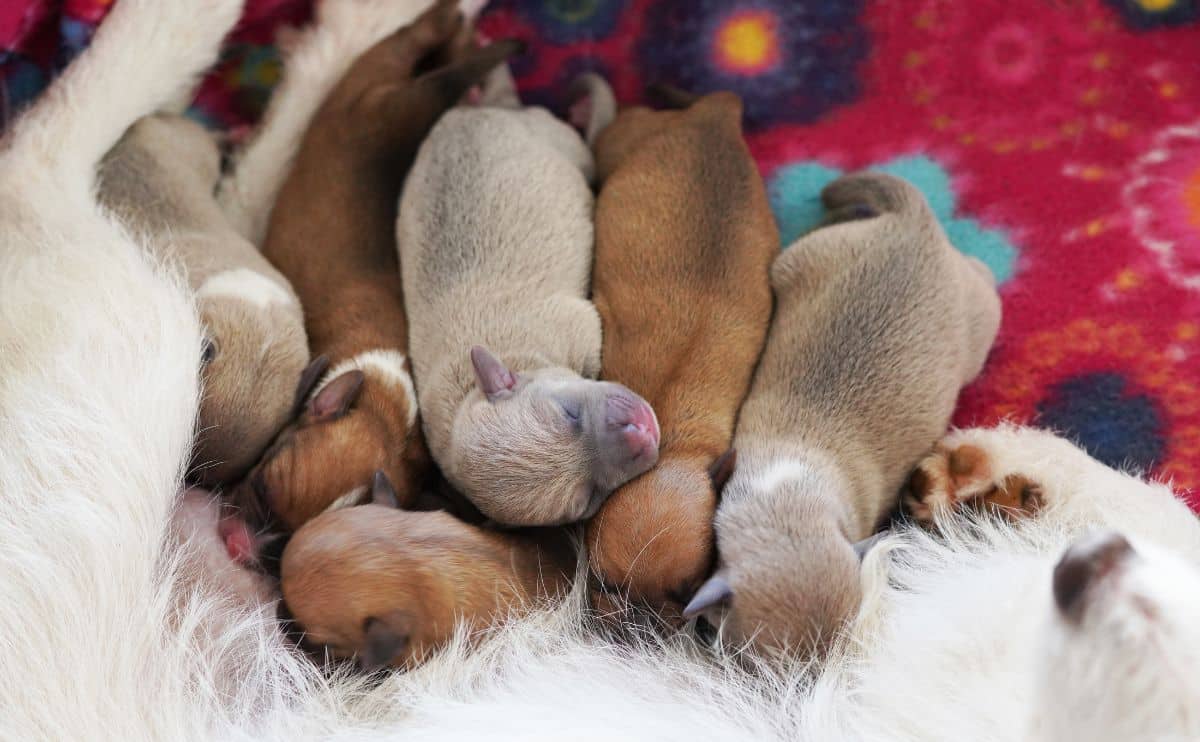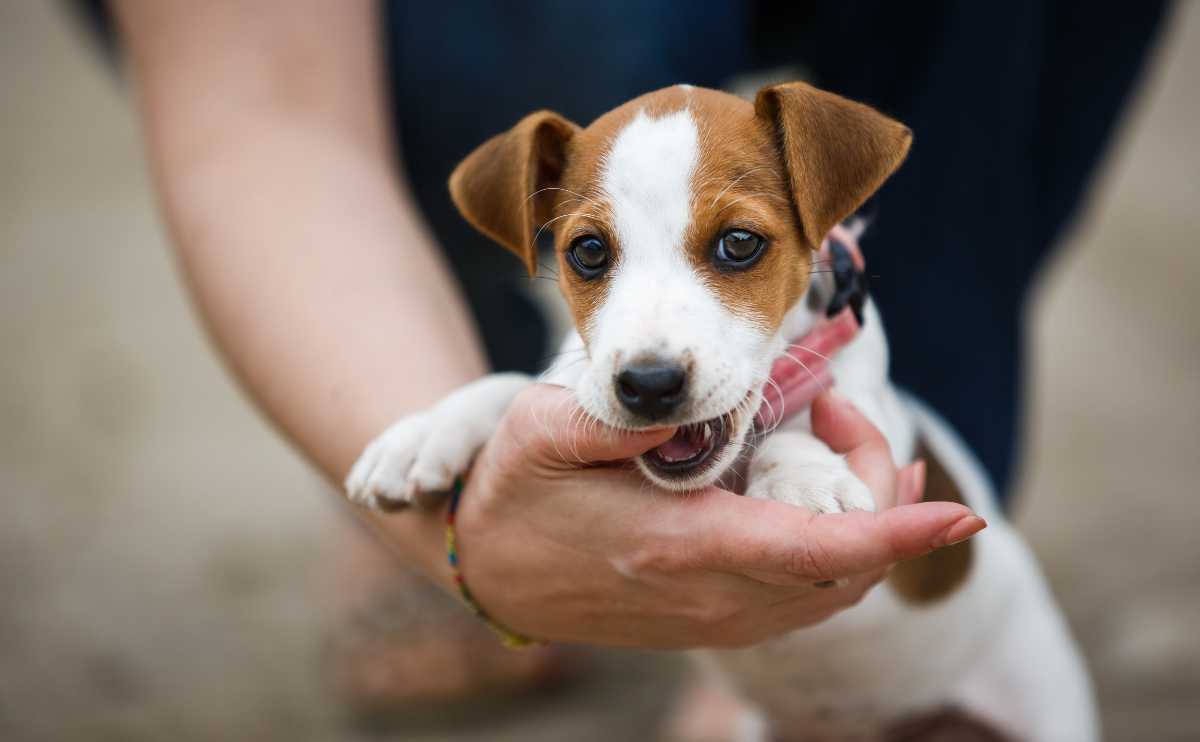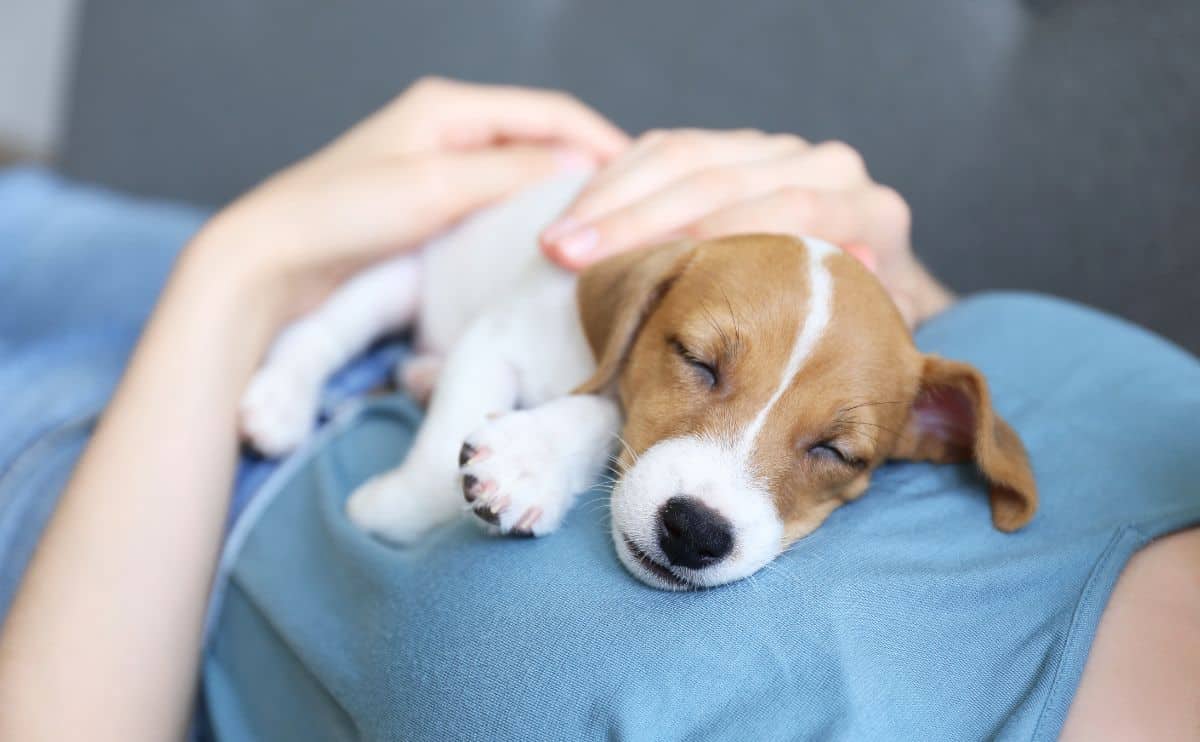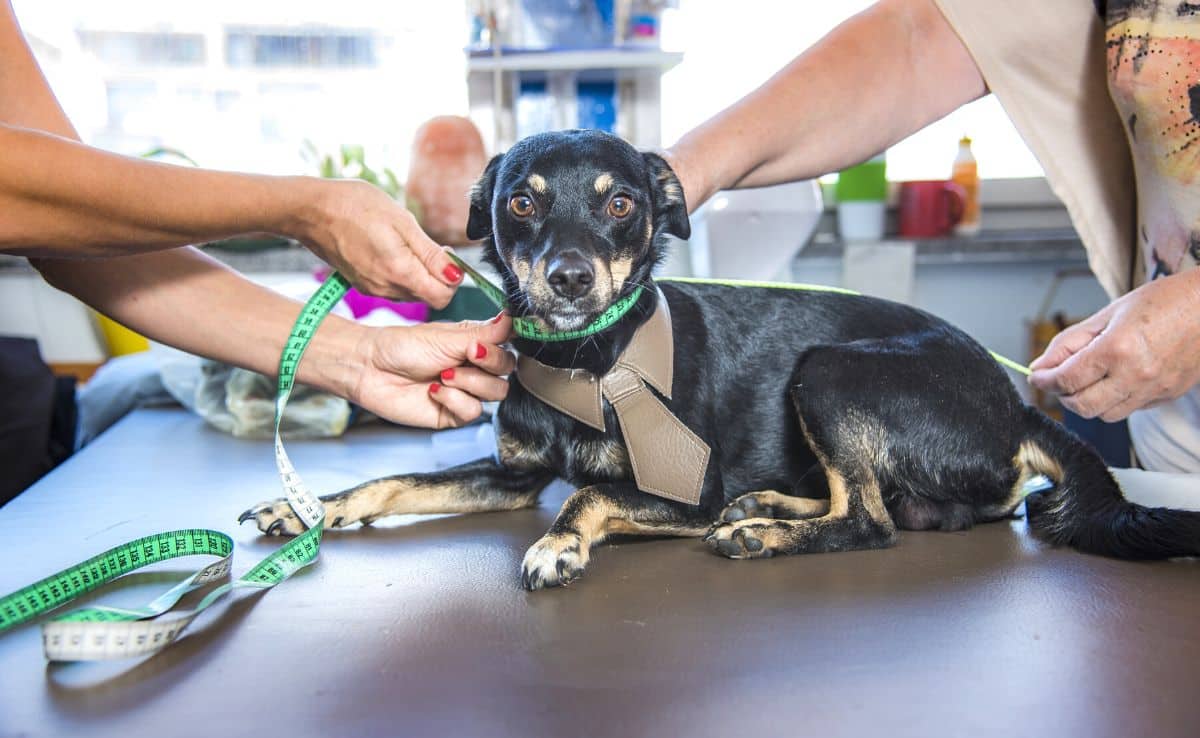When you purchase through links on our site, we may earn a commission. Here’s how it works.

Newborn puppies are quite helpless and born with closed eyes and ears. Opening their eyes is a big step, and owners have many questions. This is a huge first step in their development and one that many owners have questions about. When do puppies open their eyes? The exact time depends on your puppy’s breed, size, and factors like how early they were born.
When Do Newborn Puppies Open Their Eyes?
In general, puppies open their eyes at around two weeks old. This usually happens between ten and 14 days but can take longer for some breeds. Puppies who were born earlier may take a little longer for vision to be functional. For some breeds, the process can take up to 21 days. Many times, puppies will not open both at the same time.
When puppies are born, their eyeballs are not developed enough to withstand the bright light. The optical nerves are not strong enough at birth to protect them, so they are kept closed. The eyeballs and optic nerves are extremely sensitive to light during these first few weeks. Even after opening, the eye is not fully developed and will take several weeks to mature. Along with needing more time to grow, a puppy’s brain is still developing and must mature enough for their eyeballs to function. Puppies are born before their brains and eyeballs are fully ready and need the first two weeks of life to allow that maturation to happen.
Upon opening, a puppy’s eyeballs appear cloudy, almost milky, or blue. They will develop more over the next few weeks, and this cloudiness will clear up. Full development can take around ten weeks.
How Do Breed & Size Impact When A Puppy Opens Their Eyes?
Larger breeds often have ocular function and vision sooner than medium and smaller dogs. Large and giant breeds like Mastiffs, St. Bernards, Great Danes, and German Shepherds open theirs sooner. Medium-sized breeds like Cocker Spaniels usually can see within 10 to 14 days. Smaller breeds like Fox Terriers can take longer, around three weeks or so.. Chihuahuas usually do this around 16 or 17 days.
My 3-Week-Old Puppy Has Not Opened His Eyes. Should I Worry?
While most puppies open their eyes between 10 and 14 days, some may need a few more days for everything to develop. However, if your pup is past the 14-day mark and is not a breed like the Fox Terrier (known to open at around 21 days), it is best to reach out to your veterinarian. While a puppy taking longer than the expected 14 days does not always indicate something is wrong, if it goes beyond that, about 16 days, owners will want to ensure pups are healthy and rule out any underlying medical concern.
In some cases, puppies will open one eye first, and the other will need a few days to catch up. This is not usually cause for concern. Owners should observe and visually inspect their pups each day. Take note of any swelling, redness, discharge, or other indications of infection, foreign objects, or irritation.
When To Worry
If puppies have not opened their eyes after about 16 days, contacting your veterinarian for medical advice is a good idea. There are a few things to look out for that may be indicators that something is amiss.
- Swelling around and under a sealed eye is a sign there may be an infection or underlying eye disease. Bacteria can get in during or after birth and cause an infection. Because the eyelids are sealed shut, there is no way for the infection to drain, which can lead to swelling and discomfort. You will need medical assistance as soon as possible from your veterinarian if your puppy has an eye infection.
- Infections require medical treatment, do not try to treat this at home without medical guidance. Your veterinarian will need to drain the eye and treat the infection safely. You should also be on the lookout for any discharge or crusting from the eye.
- If your puppy’s eye looks deeper or sunken into the skull, this condition may be something called enophthalmos. There are a few underlying causes for this. Some concerns include atrophied fat pads, muscle spasms, nerve damage, and abnormal masses or growth in the eye. The condition can be painful and may require treatment.
Should I Help My Puppy Open His Eyes?
No. Do not help your puppy open his lids, even if it is after the two-week mark. They are still developing and will open when they are ready. If owners force this too soon, it can cause significant and permanent damage. Your puppy’s peepers are closed because they still need this extra layer of protection. Your help will not benefit them. If you have concerns, it is best to leave this up to your veterinarian.
What Can Newborn Puppies See?
When they are newborns, puppies cannot see much of anything. Once the eyes open at about two weeks, pups have limited, blurry vision. Their field of vision is only about a foot ahead of them. They will not see small details but can make out shapes and movements. At three to four weeks, things become a little clearer, and they can see farther but still cannot see colors and are very sensitive to light.
The ocular function will be fully developed around 8 to 12 weeks old. Pups might still be a little clumsy and may miss things, but their optics are fully developed, and they should have normal vision. If you have concerns, it is always best to reach out to the vet sooner rather than later.
Many pups go to new homes around the 12-week mark. If you bring home a pup that does not have his or her eyes fully agape, or shows any sign of illness, reach out to your vet right away.
Caring For Puppy’s Eyes
- When pups are first born, their mothers will provide most of the care they need. Owners should observe and only interfere when necessary.
- Take great care never to open a puppy’s eye. They will do this on their own when they have reached proper development.
- If you notice dirt or discharge, gently clean the area.
- Keep your pup enclosed and safe, avoiding bright lights until the eyeballs and ocular functions fully develop. Ensure to observe and inspect for any injury, infection, or abnormality.
- If your pup is a longer-haired breed, take note of the length and amount of hair that grows around the eye. They may need a trim, as hair and lashes can get into the eye leading to discomfort and even infection over time.
Signs Of Poor Eyesight
Puppies will get better with their vision and understanding of what objects are as they mature. However, some breeds are more prone to vision loss and disease. These include the Labrador Retriever, German Shepherd, Golden Retriever, Springer Spaniel, Poodle, Great Dane, Boston Terrier, Siberian Husky, and some Bulldogs. Some signs of poor or impaired vision in dogs include:
- Stumbling and unsteady on their feet.
- Excessive blinking and head shaking can indicate a puppy’s trouble seeing.
- Clumsiness, bumping into things, and staring at the ground are indicators a puppy may not be able to see well.
- Some pups who have trouble seeing may kick things like their food bowls, furniture, or toys when they cannot see them clearly.
Some dogs can be born blind, a condition that may be caused by a genetic defect in the eye. Dogs who are born blind will stay blind. In some cases, pups can develop blindness within the first few weeks of life. This may be the result of a medical condition like an infection or blockage in the eye.
Dogs who do not move their eye when light shines into them, stare at things without following them with their eyeball, and have a loss of interest in food and play may be experiencing extreme vision loss or blindness. It is important to talk to your veterinarian if you notice any of these signs or are concerned that your pup may have vision impairment.
There is much to learn about a puppy’s development, especially their health. A puppy’s eyes will usually open within the first two weeks of life, between 10 and 14 days. Some breeds, like the Fox Terrier, will take longer, up to 21 days. Owners should never try opening a puppy’s closed eye, as this can cause permanent damage. The first few weeks of having a puppy, especially a newborn, are a lot of work and can be very tense. Owners want to make sure they are not making puppy mistakes, have the right supplies like crates, toys, treats, and blankets, and are ready to meet all their fur babies’ behavioral and health needs. This includes high-quality, size-appropriate puppy food and making sure that the home is fully puppy-proof and safe. As always, consult with your veterinarian if you have any concerns about your dog’s vision or eye health.
Tagged With:

